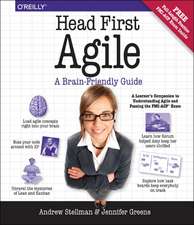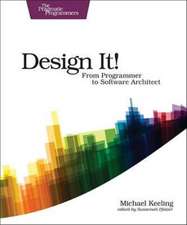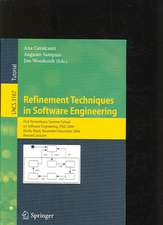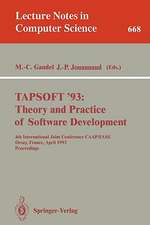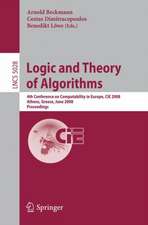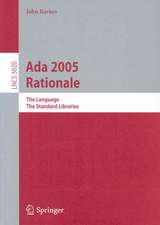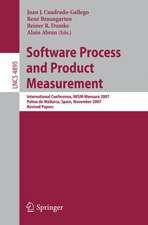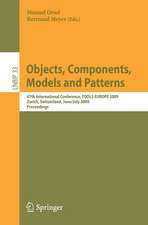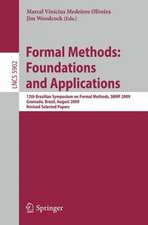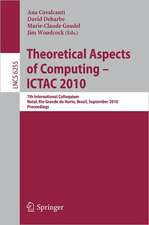FME '96: Industrial Benefit and Advances in Formal Methods: Third International Symposium of Formal Methods Europe Co-Sponsored by IFIP WG 14.3, Oxford, UK, March 18 - 22, 1996. Proceedings.: Lecture Notes in Computer Science, cartea 1051
Editat de Marie-Claude Gaudel, James Woodcocken Limba Engleză Paperback – 6 mar 1996
The 35 full revised papers included were selected from a total of 103 submissions; also included are three invited papers. The book addresses all relevant aspects of formal methods, from the point of view of the industrial R & D professional as well as from the academic viewpoint, and impressively documents the significant progress in the use of formal methods for the solution of real-world problems.
Din seria Lecture Notes in Computer Science
- 20%
 Preț: 1061.55 lei
Preț: 1061.55 lei - 20%
 Preț: 307.71 lei
Preț: 307.71 lei - 20%
 Preț: 438.69 lei
Preț: 438.69 lei - 20%
 Preț: 579.30 lei
Preț: 579.30 lei -
 Preț: 410.88 lei
Preț: 410.88 lei - 17%
 Preț: 427.22 lei
Preț: 427.22 lei - 20%
 Preț: 596.46 lei
Preț: 596.46 lei - 15%
 Preț: 448.04 lei
Preț: 448.04 lei - 20%
 Preț: 353.50 lei
Preț: 353.50 lei -
 Preț: 389.49 lei
Preț: 389.49 lei - 20%
 Preț: 309.90 lei
Preț: 309.90 lei - 20%
 Preț: 645.28 lei
Preț: 645.28 lei - 20%
 Preț: 763.23 lei
Preț: 763.23 lei - 15%
 Preț: 580.46 lei
Preț: 580.46 lei - 20%
 Preț: 310.28 lei
Preț: 310.28 lei - 20%
 Preț: 655.02 lei
Preț: 655.02 lei - 20%
 Preț: 1183.14 lei
Preț: 1183.14 lei - 20%
 Preț: 340.32 lei
Preț: 340.32 lei -
 Preț: 449.57 lei
Preț: 449.57 lei - 20%
 Preț: 591.51 lei
Preț: 591.51 lei - 18%
 Preț: 938.83 lei
Preț: 938.83 lei - 20%
 Preț: 337.00 lei
Preț: 337.00 lei - 20%
 Preț: 649.50 lei
Preț: 649.50 lei - 20%
 Preț: 607.40 lei
Preț: 607.40 lei - 20%
 Preț: 1414.79 lei
Preț: 1414.79 lei - 20%
 Preț: 1024.44 lei
Preț: 1024.44 lei - 20%
 Preț: 583.40 lei
Preț: 583.40 lei - 20%
 Preț: 453.32 lei
Preț: 453.32 lei - 20%
 Preț: 575.49 lei
Preț: 575.49 lei - 20%
 Preț: 1075.26 lei
Preț: 1075.26 lei - 20%
 Preț: 585.88 lei
Preț: 585.88 lei - 20%
 Preț: 825.93 lei
Preț: 825.93 lei - 17%
 Preț: 360.20 lei
Preț: 360.20 lei - 20%
 Preț: 763.23 lei
Preț: 763.23 lei - 20%
 Preț: 340.32 lei
Preț: 340.32 lei - 20%
 Preț: 504.58 lei
Preț: 504.58 lei - 20%
 Preț: 369.13 lei
Preț: 369.13 lei - 20%
 Preț: 580.93 lei
Preț: 580.93 lei - 20%
 Preț: 343.62 lei
Preț: 343.62 lei - 20%
 Preț: 350.21 lei
Preț: 350.21 lei - 20%
 Preț: 583.40 lei
Preț: 583.40 lei - 20%
 Preț: 583.40 lei
Preț: 583.40 lei - 15%
 Preț: 438.59 lei
Preț: 438.59 lei - 20%
 Preț: 341.95 lei
Preț: 341.95 lei - 20%
 Preț: 238.01 lei
Preț: 238.01 lei - 20%
 Preț: 538.30 lei
Preț: 538.30 lei
Preț: 666.58 lei
Preț vechi: 833.23 lei
-20% Nou
Puncte Express: 1000
Preț estimativ în valută:
127.57€ • 132.69$ • 105.31£
127.57€ • 132.69$ • 105.31£
Carte tipărită la comandă
Livrare economică 15-29 aprilie
Preluare comenzi: 021 569.72.76
Specificații
ISBN-13: 9783540609735
ISBN-10: 3540609733
Pagini: 724
Ilustrații: XIII, 711 p.
Dimensiuni: 155 x 235 x 38 mm
Greutate: 1 kg
Ediția:1996
Editura: Springer Berlin, Heidelberg
Colecția Springer
Seria Lecture Notes in Computer Science
Locul publicării:Berlin, Heidelberg, Germany
ISBN-10: 3540609733
Pagini: 724
Ilustrații: XIII, 711 p.
Dimensiuni: 155 x 235 x 38 mm
Greutate: 1 kg
Ediția:1996
Editura: Springer Berlin, Heidelberg
Colecția Springer
Seria Lecture Notes in Computer Science
Locul publicării:Berlin, Heidelberg, Germany
Public țintă
Professional/practitionerCuprins
How did software get so reliable without proof?.- A case study on the formal development of a reactor safety system.- Test automation for safety-critical systems: Industrial application and future developments.- Quantitative analysis of an application of formal methods.- Applying the B technologies to CICS.- Refining action systems within B-Tool.- Integrating action systems and Z in a medical system specification.- Formalizing Anaesthesia: A case study in formal specification.- A new system engineering methodology coupling formal specification and performance evaluation.- Formalizing new navigation requirements for NASA's Space Shuttle.- Combining VDM-SL specifications with C++ code.- Data reification without explicit abstraction functions.- Formal and informal specifications of a secure system component: Final results in a comparative study.- Visual verification of safety and liveness.- Graphical development of consistent system specifications.- Deduction in the Verification Support Environment (VSE).- Consistency and refinement for partial specification in Z.- Combining statecharts and Z for the design of safety-critical control systems.- Integrating real-time scheduling theory and program refinement.- Using a logical and categorical approach for the validation of fault-tolerant systems.- Local nondeterminism in asynchronously communicating processes.- Identification of and solutions to shortcomings of LCL, a Larch/C interface specification language.- Formal specification and verification of the pGVT algorithm.- Automatic verification of a hydroelectric power plant.- Experiences in embedded scheduling.- Model checking in practice: An analysis of the ACCESS.bus™ protocol using SPIN.- The incremental development of correct specifications for distributed systems.- Atheory of distributing train rescheduling.- An improved translation of SA/RT specification model to high-level timed Petri nets.- From testing theory to test driver implementation.- Program slicing using weakest preconditions.- A formal approach to architectural design patterns.- Modular completeness: Integrating the reuse of specified software in top-down program development.- A strategic approach to transformational design.- Correct and user-friendly implementations of transformation systems.- An example of use of formal methods to debug an embedded software.- Experiments in theorem proving and model checking for protocol verification.- Procedure-level verification of real-time concurrent systems.










